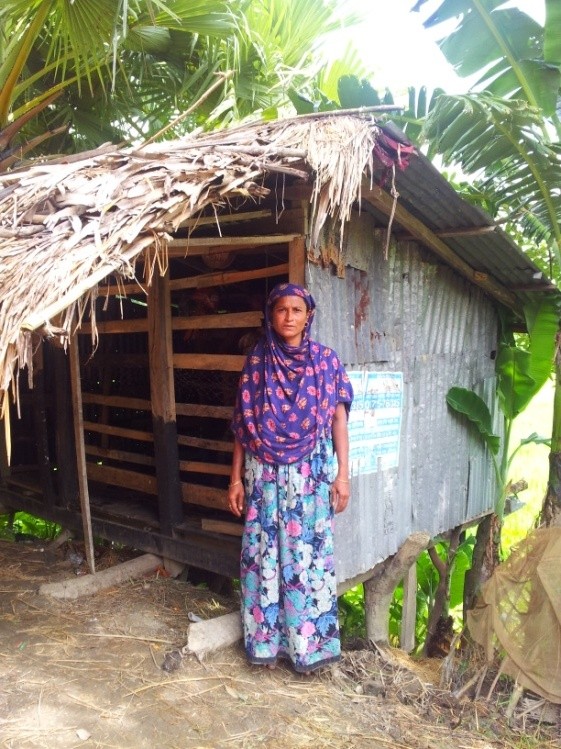
Shahida, who does not use a last name, has always been strong and optimistic, even when times have been tough; and times have often been tough. Forced to become the second wife of a much older man at the age of 14, Shahida soon became the mother of three children. Ten years ago, her husband left her and her children, never sending money to support them. Then, in 2007, Cyclone Sidr destroyed all of her household belongings, after which she resorted to begging to buy food for her family. She has never had a reliable income of her own, but her dream has always been to own a small shop that could provide a steady income for her family. Saving enough to get started has never been possible – until now.
In the years following Cyclone Sidr, Shahida’s two oldest children helped support her. Her son Sahidul (now 18) earns a modest income from a rented motorized rickshaw that he uses to transport goods and people around the village. Her daughter Ruma (now 20) now lives with her husband in Dhaka where she works in brick yards, but she left her mother her cow, whose milk Shahida sells at the local market. Both children provide her small amounts of money when they can, but they have their own families as well. Shahida has tried several times to get a loan to buy a shop and start-up inventory, but none of the microfinance institutions in her area would lend to her. To qualify, they required that she already own a productive asset and cash collateral, and that she pay an admission fee. Since she owns no productive assets and is rarely able to accumulate more than a few taka at a time, Shahida began to lose hope that she would ever start her business.
In January 2012, Shahida’s luck began to turn. She was invited to participate in a USAID-funded Food For Work program, which consists of community improvement projects for unemployed people and pays them the equivalent of a day’s wages in food. This assistance allowed Shahida to save a small amount of money and purchase a pair of chickens and a coop, her first ever individually-owned asset and steady source of income.
Then, in June 2012, a Village Savings and Loan (VSL) promoter in Shahida’s village recognized her entrepreneurial spirit and invited her to start a VSL initiative. VSL groups allow self-selected groups of poor and extremely poor beneficiaries to regularly save small amounts of money and take loans from the group’s collective funds. Others in Shahida’s community were skeptical; they warned her that the group would take her money. Shahida was also skeptical. She had heard about other savings schemes that took participants’ money out of the village, never returning the money. Like many in her village, she distrusted institutional savings schemes and preferred to save in jars and under mattresses at home.
The VSL promoter explained that this group would hold its own money and that group members would be responsible for controlling and managing the process. Shahida was impressed by this unique approach and decided to take the risk. With the help of the VSL promoter, Shahida formed a group of 25 members. Still somewhat wary of the process, the group decided to collect savings in small shares of 20 taka (approximately $0.25) each, up to five shares per meeting. They started to save.
Four months later, the group has acquired some savings and begun lending amongst its members. They now trust that the group is working for them. The VSL group is much better, they say, than saving at home, where the temptation to spend on immediate needs is often too great. Now, Shahida has saved 1,000 taka (approximately $12), the most money she has ever saved at once. She also recently borrowed 1,500 taka (approximately $18) to start the shop she has always dreamed of owning. At her shop, she sells bread, tea, biscuits and other treats. She is proud of her business and her earnings, which average 1,200 to 1,500 taka (approximately $14-$18) per month.
With this new source of reliable income, Shahida is able to afford food for herself, and she rarely needs to beg anymore. She plans to take a larger loan from the VSL group in the future and invest in more inventory for her shop. Shahida says: “Before joining the VSL group I had to rely on others to give me money. I had to live week to week as I tried to find money to buy my basic food. Now with the VSL group, I can borrow and make a bigger business. I am able to think about my future again.”
Life is still difficult. Shahida's income is still small and her store is sparsely stocked. But with her strength and optimism, and with the ability to save and borrow through the VSL, she is confident that she will rebuild her life and become independent.
This Save the Children program plans to work with over 320 VSL groups to help poor and extremely poor participants improve their economic security. These VSL groups form their own regulations, manage their own savings, provide service charge-bearing loans to members, and offer a limited form of financial insurance through an optional social fund. By combining VSL groups with income-generation support, Save the Children and USAID aim to increase incomes and food security for households in the Barisal region of Bangladesh.







Comment
Make a general inquiry or suggest an improvement.